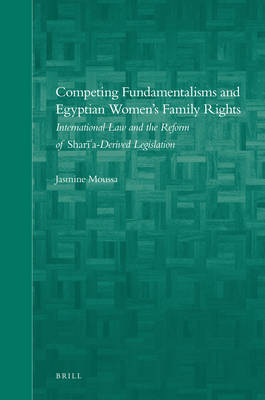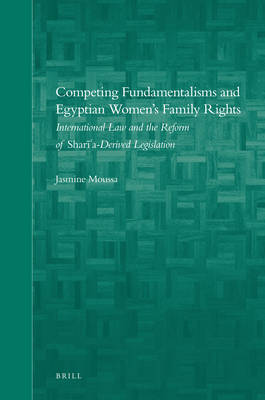
- Afhalen na 1 uur in een winkel met voorraad
- Gratis thuislevering in België vanaf € 30
- Ruim aanbod met 7 miljoen producten
- Afhalen na 1 uur in een winkel met voorraad
- Gratis thuislevering in België vanaf € 30
- Ruim aanbod met 7 miljoen producten
Zoeken
Competing Fundamentalisms and Egyptian Women's Family Rights
International Law and the Reform of Sharī'a-Derived Legislation
Jasmine Moussa
€ 251,95
+ 503 punten
Omschrijving
The debate surrounding women's family rights under Sharī'a-derived law has long been held captive to the competing fundamentalisms of universalism and cultural relativism. These two conflicting perspectives fail to promote practical tools through which such laws can be reformed, without prejudice to their religious nature. This book examines the development of Egypt's Sharī'a-derived family law, and its compatibility with international obligations to eliminate discrimination against women. It highlights the interplay between domestic reform processes, grounded in the tools of takhayyur, talfiq and ijtihad, and international institutions and mechanisms. In attempting to reconcile these two seemingly dissonant value systems, this book underscores the shortcomings of Egypt's legislation, proposes particular reforms, while simultaneously presenting alternatives to insular interpretations of international women's rights law.
Specificaties
Betrokkenen
- Auteur(s):
- Uitgeverij:
Inhoud
- Aantal bladzijden:
- 320
- Taal:
- Engels
- Reeks:
- Reeksnummer:
- nr. 4
Eigenschappen
- Productcode (EAN):
- 9789004203099
- Verschijningsdatum:
- 22/06/2011
- Uitvoering:
- Hardcover
- Formaat:
- Genaaid
- Afmetingen:
- 168 mm x 244 mm
- Gewicht:
- 566 g

Alleen bij Standaard Boekhandel
+ 503 punten op je klantenkaart van Standaard Boekhandel
Beoordelingen
We publiceren alleen reviews die voldoen aan de voorwaarden voor reviews. Bekijk onze voorwaarden voor reviews.








